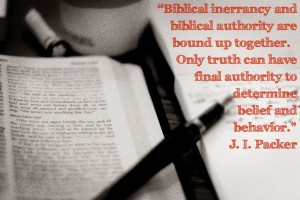There are many great books and articles written on the subject of biblical inerrancy and authority. I doubt that this writing will go down in history as one of the greats, but it is important to continue to sound the trumpet call of inerrancy, for without it, there is no authority. Paul urged Timothy to preach the word, to be ready in season and out of season. Interestingly, and not accidentally, he issued this charge to Timothy “in the presence of God and of Jesus Christ,” only after these poignant words, “All Scripture is breathed out by God and profitable for teaching, for reproof, for correction, and for training in righteousness, that the man of God may be competent, equipped for every good work.”
Paul’s exhortation to Timothy to preach came only after  declaring the authority of the Bible. The Bible is authoritative, according to Paul, because it has God as its author. In a book written more than thirty years ago, J. I. Packer warned, “Biblical inerrancy and authority are bound up together. Only truth can have final authority to determine belief and behavior” (Beyond the Battle for the Bible). Only truth. Errors, lies, gossip, conjecture, educated guesses, these things have no authority, only truth has authority. The Bible can only be authoritative if it is true, and if it is filled with error, it is not true.
declaring the authority of the Bible. The Bible is authoritative, according to Paul, because it has God as its author. In a book written more than thirty years ago, J. I. Packer warned, “Biblical inerrancy and authority are bound up together. Only truth can have final authority to determine belief and behavior” (Beyond the Battle for the Bible). Only truth. Errors, lies, gossip, conjecture, educated guesses, these things have no authority, only truth has authority. The Bible can only be authoritative if it is true, and if it is filled with error, it is not true.
Packer goes on to point out that Jesus and the writers of the New and Old Testaments certainly believed the Bible to be true. For us to do other than Jesus and the biblical writers by editing and reducing the Bible for our own purposes, “we are likely to be found before long scaling down its mysteries (e.g., incarnation and atonement) and relativizing its absolutes (e.g., in sexual ethics) in the light of our own divergent ideas.” There is no middle ground, either the Bible has authority in its own right or it doesn’t. To take the old adage that it has authority in matters pertaining to salvation, for instance, is not far enough. This is not far enough because sin pertains to salvation, salvation is necessary only because human beings are sinful. When our edits of the Scripture make some sin to be no longer sin, the need for the Savior is diminished and repentance is not found. For the scripture to have authority in things pertaining to salvation it must also be seen as authoritative on sin.
Do we worship the Bible? No, but we do worship its author, and as such, we should trust Him at His Word. Because we worship God, we do not seek to change his Words or alter his rules, He alone has the authority to tell us how to live. The Bible has authority not because I choose to grant it, but because it has the Creator of all things as its author. Because God is the author and the Bible has authority, I must look to it to guide both my belief and my behavior.

